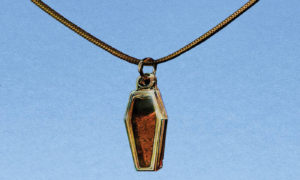 Birthmarks, the third full-length album from Canadian indie group Born Ruffians, takes its title from the matching birthmarks that frontman Luke Lalonde and his girlfriend share. But before you think it’s purely a romantic gesture, the band also stated they more or less took to the name because of its alliterative feel (coupled with the band’s moniker) and its suggestion of a re-emergence on the indie scene. And while a lot of Ruffian followers purport this album as a real coming-together of the band’s unique vocal-driven quirky-pop sound, I sense an unfocused symbolism to the nature of that deceivingly irresolute title, and it manifests itself over the course of a dozen digressive tracks half-hinged on other groups’ more recognizable sounds.
Birthmarks, the third full-length album from Canadian indie group Born Ruffians, takes its title from the matching birthmarks that frontman Luke Lalonde and his girlfriend share. But before you think it’s purely a romantic gesture, the band also stated they more or less took to the name because of its alliterative feel (coupled with the band’s moniker) and its suggestion of a re-emergence on the indie scene. And while a lot of Ruffian followers purport this album as a real coming-together of the band’s unique vocal-driven quirky-pop sound, I sense an unfocused symbolism to the nature of that deceivingly irresolute title, and it manifests itself over the course of a dozen digressive tracks half-hinged on other groups’ more recognizable sounds.
The sound production is most certainly compact and focused but the musical style seems divided by different objectives. The intro to “Needle” is straight out of a Fleet Foxes song, and though the track kicks up a boisterous pop-laden stroll with leaping vocals that really hold promise, it eventually lapses into another spiritual lament that proves too dichotomous to achieve any effectiveness. For a few seconds in “6-5000” we are duped with a dark, ominous rolling before a cheery mix-up of Walkmen and Vampire Weekend bursts onto the scene. Such nimble musical thefts repeat themselves until they are firmly entrenched as a texture to each track, and they confuse what might otherwise be a solid, recognizable sound.
If you can get past that though, there are certainly some interesting portions to the album, which hits its stride with “Cold Pop.” I almost wanted to laugh when I first heard this track, with its lust-wrangled lyrics, yelping voice, and theatrical “aw-ooh” backing harmonies. It’s supposed to be sexy, but it’s really just funny. However, this is what makes it unique and effective—and by the second listen its catchy refrains had already hooked themselves firmly in my mind. I felt that this was what the album should have been: a collection of delectable pseudo-pop. Certainly there’s more fun pop in tracks like “Ocean’s Deep” and “Permanent Hesitation,” but because of the tendencies to rely on singular, quickly-progressing melodies, the pop is worn out by lasting twice as long as it should.
The album’s latter half diverges into more experimental territory. “Rage Flows” grooves with a crushed aesthetic and builds to a potent chorus. The beautifully melancholic “So Slow” disperses an apocalyptic vision with arena-style echoes and thunderous drums. Spritely flutes abound in the wandering ululations of “With Her Shadow” and the bluegrass rock of “Dancing On The Edge Of Our Graves.” The finale “Never Age” melodically infuses strange pessimism with breezy hope. It’s all very interesting, but doesn’t connect to the earlier half of the album in any meaningful way. It all speaks to a loss of direction, and while at the end of the day Birthmark may be a good deal of fun, it’s just not as satisfying as it could be.










